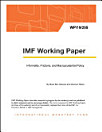The Welfare Implications of Services Liberalization in a Developing Country: Evidence from Tunisia
Mr.Nizar Jouini · Mr.Nooman Rebei
Mei 2013 · International Monetary Fund
eBook
43
Halaman
reportRating dan ulasan tidak diverifikasi Pelajari Lebih Lanjut
Tentang eBook ini
We propose an integrated method based on a two-sector small open economy dynamic and stochastic general equilibrium model to estimate non-tariff barriers and quantify the impact of services liberalization. The major component of trade barriers is explicitly modeled through the introduction of entry-sunk costs. Hence, liberalization is treated assuming a government's policy decision aimed at reducing those costs. Then, we estimate the model using Bayesian techniques for Tunisia and the Euro Area. The paper presents a precise quantitative evaluation of services trade barriers as the difference between entry-sunk costs in Tunisia versus the Euro Area. We find significant welfare benefits in addition to aggregate and sectoral growth gains the Tunisian economy could attain following services liberalization. Surprisingly, the goods sector is the one that benefits the most from services liberalization in the short- and long-term horizons.
Beri rating eBook ini
Sampaikan pendapat Anda.
Informasi bacaan
Smartphone dan tablet
Instal aplikasi Google Play Buku untuk Android dan iPad/iPhone. Aplikasi akan disinkronkan secara otomatis dengan akun Anda dan dapat diakses secara online maupun offline di mana saja.
Laptop dan komputer
Anda dapat mendengarkan buku audio yang dibeli di Google Play menggunakan browser web komputer.
eReader dan perangkat lainnya
Untuk membaca di perangkat e-ink seperti Kobo eReaders, Anda perlu mendownload file dan mentransfernya ke perangkat Anda. Ikuti petunjuk Pusat bantuan yang mendetail untuk mentransfer file ke eReaders yang didukung.






